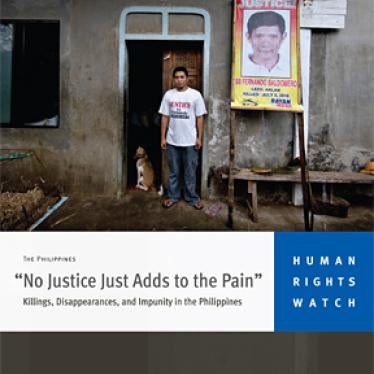(New York) – The final two defense witnesses are scheduled to testify this week in Tagum City in the first trial in the Philippines in a decade in which soldiers have been charged with homicide in an armed conflict situation, Human Rights Watch said today.
“The Japalali trial offers an important opportunity to provide justice for the victims of a serious human rights violation,” said Elaine Pearson, deputy Asia director at Human Rights Watch. “But the conduct in the case has raised critical due process concerns that the Aquino administration should address.”
On September 8, 2004, more than 30 soldiers were allegedly involved in the fatal shooting of Bacar Japalali, a suspected member of the Moro National Liberation Front (MNLF), an ethnic Moro armed group, and his pregnant wife, Carmen, while they were asleep in their home in Bincungan, Tagum City.
Japalali’s brother Talib Japalali told Human Rights Watch that after being awakened by the sound of gunfire, he went to his brother’s house. “There were bullet holes everywhere,” he said. “Pieces of bone were splattered around the house.” He said that he was allowed to see his brother’s body and found him lying on his sleeping mat under his mosquito net.
Soldiers told Talib Japalali that they shot his brother Bacar because he fired at them. However, forensic evidence revealed no traces of gunpowder on the hands of the couple and two eyewitness accounts countered the military’s claim that the deaths were the result of an armed encounter.
The case has been fraught with government-imposed obstacles from the start, said Human Rights Watch. In 2004, the initial civilian prosecutor dismissed the complaint brought by the Japalali family for lack of probable cause without attempting to gather additional evidence or informing the family. The following year, the deputy ombudsman overturned this decision and sought to file murder charges against 32 soldiers.
In January 2006, the case was filed before branch 2 of the Tagum City Regional Trial Court under Judge Justino G. Aventurado. Aventuradodowngraded the charges from murder to the lesser charge of homicide and dismissed the charges against 24 soldiers. The eight arrest warrants were not served until the Japalali family placed considerable pressure on the police and a nongovernmental organization assisted with serving the warrants.All eight defendants are currently confined to a military camp.
The Japalali family has alleged that Aventuradoattempted to negotiate a “settlement” for the killing of Bacar and Carmen Japalali on behalf of the accused soldiers. Talib Japalali said that one day when he went to the court, he received a message that the judge wanted to see him. In a private meeting the judge allegedly told him, “They’re willing to pay.” Japalali said he replied, “I did not come here for money. I want justice.”The Japalali family filed a complaint against Aventuradowith the Supreme Court, but no disciplinary or criminal action has been taken.
The trial is scheduled to resume September 15, 2011, before the Regional Trial Court, Branch 31. If convicted, the soldiers face up to 20 years in prison.







